GALLUP NEWS SERVICE
PRINCETON, NJ -- George W. Bush has made Social Security reform a top priority for his second term in office. Americans agree that it should be high on the legislative agenda, but don't necessarily agree with a proposal to allow workers to invest a portion of their Social Security taxes in the stock market -- something Bush supports. In part, support depends on how the program is described to survey respondents, with support levels in recent polls ranging from 48% to 60%. If Social Security is indeed partially privatized, slightly more than 4 in 10 Americans expect it will not affect them personally, but those who feel they would be affected are about evenly divided as to whether it would help or hurt them.
A Dec. 17-19 CNN/USA Today/Gallup poll finds 82% of Americans saying it is at least very important for Congress and the president to deal with Social Security in the next year, including 40% who say it is extremely important. These figures are in line with what Gallup found in 2002 and 2003.
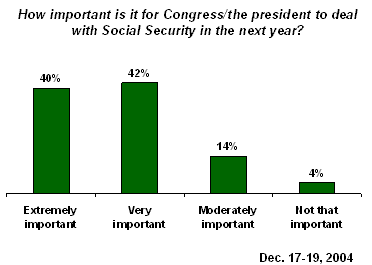
Among the 18 policy issues whose importance Americans rated, Social Security ranks among the top 6, behind Iraq (90%), terrorism (87%), healthcare costs (87%), the economy (86%), and education (86%).
Private Investment of Social Security Taxes
One prominent Social Security proposal attracting a lot of attention is the idea of allowing workers to invest part of their Social Security taxes in the stock market. This would provide the possibility of greater returns on a person's investment, but also carries more risk than the safe investments in which the government currently invests Social Security revenues. According to the CNN/USA Today/Gallup poll, the public is divided over such a proposal, with 48% in favor and 48% opposed.
The measured level of support for partial Social Security privatization depends somewhat on how the program is described to respondents. Various recent polls have shown support levels for the privatization plan ranging from almost half to 60%.
- A recent Fox News/Opinion Dynamics poll finds 60% saying
"people should have the choice to invest privately up to 5% of
their Social Security contributions." Only 27% say they should not.
This question talks about giving workers the choice and puts a
specific number (5%) on how much of the taxes could be
invested.
- An ABC News/Washington Post poll finds majority
support (53%) for "a plan in which people who chose to could invest
some of their Social Security contributions in the stock market."
Again, this question touches on the "choice" aspect of the program.
But only 46% of those who initially said they supported the
program continued to do so when they were told that
instituting the system may necessitate the government's borrowing
up to $2 trillion to set it up.
- A CBS News/New York Times poll finds 49% saying it is
a "good idea" to allow "individuals to invest portions of their
Social Security taxes on their own." Forty-five percent say it is a
"bad idea."
- Previous Gallup questions specifying that a portion of Social Security contributions could be invested in "personal retirement accounts" found higher support for privatization than does the current wording that simply talks about investments in stocks and bonds.
The most recent Gallup data show that support for private investment of Social Security taxes varies by subgroup. As is typically the case, younger Americans are much more likely to favor the proposal than are older Americans. Fifty-seven percent of those under age 50 favor the proposal, compared with 37% of those aged 50 and older.
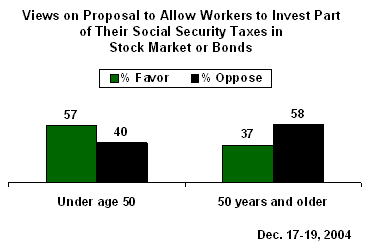
Also, those residing in higher-income households are much more likely to favor the proposal. Sixty percent of Americans living in households whose incomes are $75,000 or more say they favor it. That drops to 51% in households having incomes between $30,000 and $74,999, and 34% in those with incomes less than $30,000.
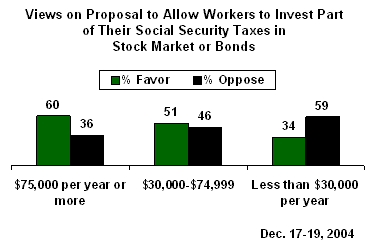
Perhaps because President Bush has strongly endorsed this reform proposal, Republicans (69%) are nearly three times as likely as Democrats (26%) to favor it.
Expected Personal Impact of Social Security Privatization
The plurality of Americans, 43%, say the proposal to allow private investment of Social Security taxes would have no effect on them personally if it becomes law. Another 29% say it would help them and 26% say it would hurt.
These perceptions also vary by age -- those under age 50 are nearly twice as likely to think passage of the proposal would help (42%) rather than hurt (23%) them. The vast majority of Americans currently at retirement age (65 and older), 70%, believe passage of the proposal would not affect them. Those in the pre-retirement years (50 to 64 years old) are most pessimistic: nearly twice as many people in this age group think the proposal would hurt (33%) -- rather than help (19%) -- them.
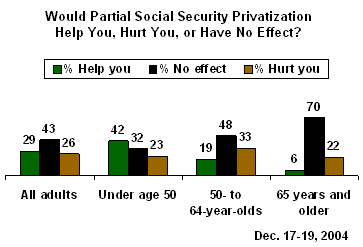
Household income levels are also related to the way Americans expect passage of the proposal to affect them. The greater the household income, the more likely people are to think the proposal will help them personally; the less the household income, the more likely people are to think the proposal will hurt them.
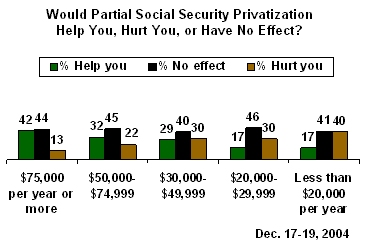
Expected Impact of Social Security Privatization on the System
Americans are generally divided in their views on how partially privatizing Social Security would affect the Social Security system and the federal budget.
- Forty-nine percent believe the federal budget deficit would increase significantly if the proposal were passed, while 43% believe the deficit would not increase.
- Forty-seven percent say passing the proposal will strengthen Social Security in the long run, while an equal number believe it will not have this benefit.
- Forty-six percent believe it would reduce benefits to current Social Security recipients, while 48% disagree.
- Americans are less divided in their views of the effect of privatization on future benefits. Fifty-eight percent think the guaranteed Social Security benefits to future recipients would be reduced if the proposal passed, while 36% believe this would not happen.
Perceptions of the impact of partial Social Security privatization on the system and the federal budget vary significantly by partisanship. Republicans are much more likely than independents or Democrats to expect positive results, and much less likely to anticipate negative results, from the proposal.
|
Overall |
Democrat |
Independent |
Republican |
|
|
|
|
|
|
|
|
Deficit would increase |
49% |
60% |
51% |
36% |
|
Future benefits reduced |
58% |
71% |
57% |
45% |
|
System stronger in long run |
47% |
28% |
51% |
64% |
|
Current benefits reduced |
46% |
59% |
48% |
32% |
Survey Methods
These results are based on telephone interviews with a randomly selected national sample of 1,002 adults, aged 18 and older, conducted Dec. 17-19, 2004. For results based on this sample, one can say with 95% confidence that the maximum error attributable to sampling and other random effects is ±3 percentage points. In addition to sampling error, question wording and practical difficulties in conducting surveys can introduce error or bias into the findings of public opinion polls.
Thinking now about Social Security,
16. As you may know, a proposal has been made that would allow workers to invest part of their Social Security taxes in the stock market or in bonds, while the rest of those taxes would remain in the Social Security system. Do you favor or oppose this proposal?
|
|
Favor |
Oppose |
No opinion |
|
|
|
|
|
|
2004 Dec 17-19 |
48% |
48 |
4 |
17. If this proposal becomes law, do you think it will mostly -- [ROTATED: help you personally, have no effect, or mostly hurt you personally]?
|
Help |
No effect |
Hurt |
No opinion |
|
|
|
|
|
|
|
|
2004 Dec 17-19 |
29% |
43 |
26 |
2 |
18. If this proposal becomes law, do you think each of the following would -- or would not -- happen? How about -- [ITEMS A-C ROTATED, ITEM D READ LAST]?
A. The federal budget deficit would increase significantly
|
|
Yes, would |
No, would not |
No opinion |
|
|
|
|
|
|
2004 Dec 17-19 |
49% |
43 |
8 |
B. The guaranteed Social Security benefits to future recipients would be reduced
|
|
Yes, would |
No, would not |
No opinion |
|
|
|
|
|
|
2004 Dec 17-19 |
58% |
36 |
6 |
C. The Social Security system would be stronger in the long run
|
|
Yes, would |
No, would not |
No opinion |
|
|
|
|
|
|
2004 Dec 17-19 |
47% |
47 |
6 |
D. Current Social Security recipients would receive less money in their Social Security checks
|
|
Yes, would |
No, would not |
No opinion |
|
|
|
|
|
|
2004 Dec 17-19 |
46% |
48 |
6 |